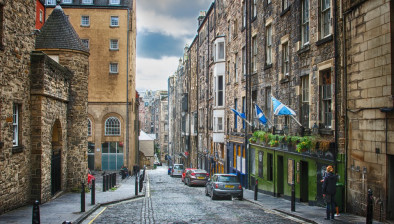Scottish Government issues reminder of looming short-term lets deadline

Housing minister Paul McLennan
There looks to be no plans from the Scottish Government to extend the deadline for short-term let operators after it issued another reminder of the looming October 1 deadline by highlighting that no application so far has been rejected.
The government said it has introduced licensing to ensure short-term lets in Scotland are safe and meet consistent quality standards, including having gas certificates and suitable electrical equipment.
Last week the Scottish Bed & Breakfast Association wrote to First Minister Humza Yousaf calling for an intervention to save thousands of small tourism accommodation businesses in Scotland by pausing the introduction of short-term let licensing.
Housing minister Paul McLennan said: “Quality short-term let accommodation is vital to Scotland’s tourism sector and wider economy. It aims to protect the reputation of responsible operators and ensure the sector is regulated in line with other accommodation such as hotels and caravan parks, giving guests assurance of consistent safety standards.
“There has been a lead time of almost two years to the October deadline. Official statistics published today cover only up to the end of March and we know many more hosts have applied in recent months. Operators can take confidence that local authorities are working pragmatically to support new licensees through the application process – and we can see from the information that no completed applications had been rejected in the period, or since.
“So, I would repeat calls to everyone within the industry to back the scheme and encourage short-term let operators to apply for a licence in good time and before the 1 October deadline.”
The reminder comes as new statistics found that a total of 2,587 valid applications have been received by local authorities since the Short Term Lets Licensing Scheme opened on 1 October 2022, with 1,178 received during the quarter Oct to Dec 2022 and 1,409 received during Jan to Mar 2023.
Other key points from the report include:
- Local authorities with the highest numbers of total valid applications received include Highland (920), Dumfries and Galloway (436) and Fife (300), which together account for almost two-thirds (1,656 or 64%) of all valid applications received up to 31 March 2023. There has been a relatively low number of applications for City of Edinburgh (90), Glasgow City (78), and other urban local authorities such as Aberdeen City (32) and Dundee (18).
- Applications as a rate per 10,000 dwellings have been highest in Na h-Eileanan Siar (78 per 10,000 dwellings), Highland (75), Dumfries and Galloway (57) and Orkney (44), whilst there has been a relatively low rate of applications for City of Edinburgh (3.4), Glasgow City (2.4) and other urban local authorities such as Aberdeen City (2.6) and Dundee City (2.4).
- Nearly all (2,569 or 99%) of the total 2,587 valid applications received up to 31 March 2023 have been for a full licence, with 9 (0.3%) being for a temporary licence and 9 (0.3%) being for a temporary exemption.
- Information on the provisional or new status of the licence application, as per the quarter the application was received, is available for 2,046 (80%) applications of valid applications. Of these, 1,788 (87%) have been for provisional licences (i.e. applications from existing hosts) and 258 (13%) have been for new licences (i.e. applications from new operators/hosts or for properties previously unlet before 1st October 2022).
- As at 31 March 2023, 1,625 (63%) of the 2,587 valid applications received were pending determination, 848 (33%) had been granted with no additional conditions, 102 (3%) had been granted with additional conditions, 12 (0.5%) had been withdrawn, and none had been refused, revoked, suspended or lapsed.
- Of the 950 applications granted by 31 March 2023, 14 were decided in October to December 2022, and 936 were decided in January to March 2023.
- Of the 2,587 total valid applications received by 31 March 2023, the majority (2,107 or 81%) relate to secondary letting (i.e. where a non-primary residence is let out), with 271 (10%) being for home sharing, 129 (5%) for home letting, and 80 (3%) for a mixture of home sharing and letting. A total of 1,094 (42%) applications were in relation to lets for detached houses, 379 (15%) for semi-detached houses, 289 (11%) for terraced houses, 577 (22%) for self-contained flats, and 248 (10%) for unconventional dwellings.
- As at 31 March 2023 there were a total of 2,085 licences or exemptions in operation, consisting of 943 (45%) full licences, 1,135 (54%) provisional licences pending a final decision, 2 (0.1%) temporary licences, and 5 (0.2%) temporary exemptions.
- Information on EPC rating is available for 51% (1,065) of the 2,095 licences or exemptions in operation. Of these the majority (79% or 839 licences) had a rating of band C, D or E, with 10% (106 licences) having the highest ratings of A or B, and 11% (120 licences) having the lowest ratings of F or G
- Accommodation information has been provided for 96% (2,010) of the 2,085 licenses or exemptions in operation, equating to a total of 2,295 accommodation units. Information on the number of bedrooms was provided for all but 1 licence, totalling 5,640 bedrooms, whilst information on the maximum occupancy was provided for all but 3 licences, equating to a total maximum occupancy of 10,969 people.
Maree McLeod, owner of The Gatehouse in Reay, near Thurso, said: “The licensing scheme will ensure guests know properties like ours are of the highest standard and are compliant with the latest safety regulations. I have spent a lot of time and money ensuring our business is of the highest quality. We try our best to do the best. It is therefore pleasing that other short-term lets will be brought to that same level. By doing this, Scotland will become an international leader in this market.
“The process of applying for a short-term let with Highland Council was made easy and straightforward because of the really helpful team there. I would encourage every owner to go through the process of obtaining a licence. It not only marks out the property as a leader in its class. It marks out the owners too. Our business has improved through this process.”









